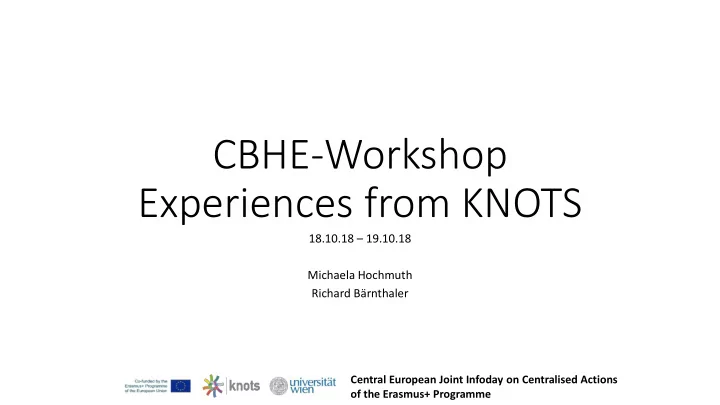

CBHE-Workshop Experiences from KNOTS 18.10.18 – 19.10.18 Michaela Hochmuth Richard Bärnthaler Central European Joint Infoday on Centralised Actions of the Erasmus+ Programme
KNOTS: A Brief Introduction • Fostering multi-lateral knowledge networks of transdisciplinary studies to tackle global challenges. • Erasmus+ KA2, CBHE • 8 Universities: Austria (1), Germany (1), Czech Republic (1), Thailand (2), Vietnam (3) • Build capacities for transdisciplinary research and teaching (not a research project) • Transdisciplinarity: transcending disciplinary boundaries AND including non-academic actors into the process of knowledge production Central European Joint Infoday on Centralised Actions 2 18.10.218 of the Erasmus+ Programme
How did we find suitable partners? • Bilateral contacts between individual staff members in our department (DS) and the respective partner universities; e.g. • Erasmus+ International Mobility cooperation • Guest lectures • Former employment • Joint research projects • Make use of your contacts and existing networks. • Build upon existing knowledge and strengths of partners Central European Joint Infoday on Centralised Actions 3 18.10.218 of the Erasmus+ Programme
How did we write the project proposal? • Be aware of the policy context • EU Strategies and Key Policies (e.g. 2020 Strategy - EU Agenda for Jobs, Growth, Fairness & Democratic Change – Policy Priorities) -> National and Regional Priorities of ERASMUS+ programme -> Call for proposal (Specific Action) • Solution-oriented • Convert problems/challenges into objectives and demonstrate the feasability of achieving these objectives • Consult Erasmus+ National Agencies and Contact Points (Austria: OEAD) • https://eacea.ec.europa.eu/erasmus-plus/contacts_en • Contact third-funding agencies and other Erasmus+ projects at your home university • Look into other successful project proposals, but also into best practice examples: https://ec.europa.eu/programmes/erasmus-plus/projects/ Central European Joint Infoday on Centralised Actions 4 18.10.218 of the Erasmus+ Programme
How did we write the project proposal? • Most of the proposal writing was done at the coordinating institution • Administrative and scientific staff • Inclusion of partners as early as possible! Ownership! • Edit and review with the project consortium • Roles, activities, project timeline,… • Close Communication with International Office and Finance Department of the University of Vienna • Crucial: • Involve Erasmus+ Contact Points and National Agencies from the beginning! • Be aware of deadlines (Universities & EACEA) Central European Joint Infoday on Centralised Actions 5 18.10.218 of the Erasmus+ Programme
How are we communicating with the EACA? • Project Officer - Project Coordinator. • Document everything! Keep all e-mails! • Contact immediately if you have any major problems, changes in budget, etc. • Get and keep written confirmations! • International Office and Research Services might be involved. • Clear rules for amendments and official changes. • e.g.: changes in addresses, deadlines, contact details ,… • Beneficiary Space and Participant Portal (e.g. for reporting and documentation). • Make use of the Project Guidelines! Central European Joint Infoday on Centralised Actions 6 of the Erasmus+ Programme 18.10.218
How are we communicating with our partners? • Email communication • Online-meetings (Organized along respective working teams) • Project management meetings during workpackage implementation • Regular meetings and updates • Tight/continuous communication and clear responsibilites. • Within the respective beneficiary • Within the project Central European Joint Infoday on Centralised Actions 7 18.10.218 of the Erasmus+ Programme
Major challenges and how to tackle them • Creating ownership - flat versus hierarchical approaches: balance is needed, depends on context and institutions involved • Bureaucracy and reporting: • provide clear guidelines and standardize as much as possible, • checklists • one responsible person per institution • project budget allows for hiring administrative staff – make use of it! • Political context: necessity to be pragmatic • Finances: Be sure all beneficiaries understood and implement guidelines accordingly • EU guidelines might clash with the beneficiaries internal guidelines, (e.g. overheads, co-financing principle ,…) Central European Joint Infoday on Centralised Actions 8 of the Erasmus+ Programme
• knots.univie.ac.at • facebook: @KNOTShighereducation • International Erasmus+ Contact Points https://eacea.ec.europa.eu/erasmus-plus/contacts/international-erasmus-plus-contact-points_en • Project Management Methodology - PM2 http://www.fos-unm.si/media/pdf/e-knjige/project_management_methodology_guide.pdf Central European Joint Infoday on Centralised Actions 9 18.10.218 of the Erasmus+ Programme
Recommend
More recommend